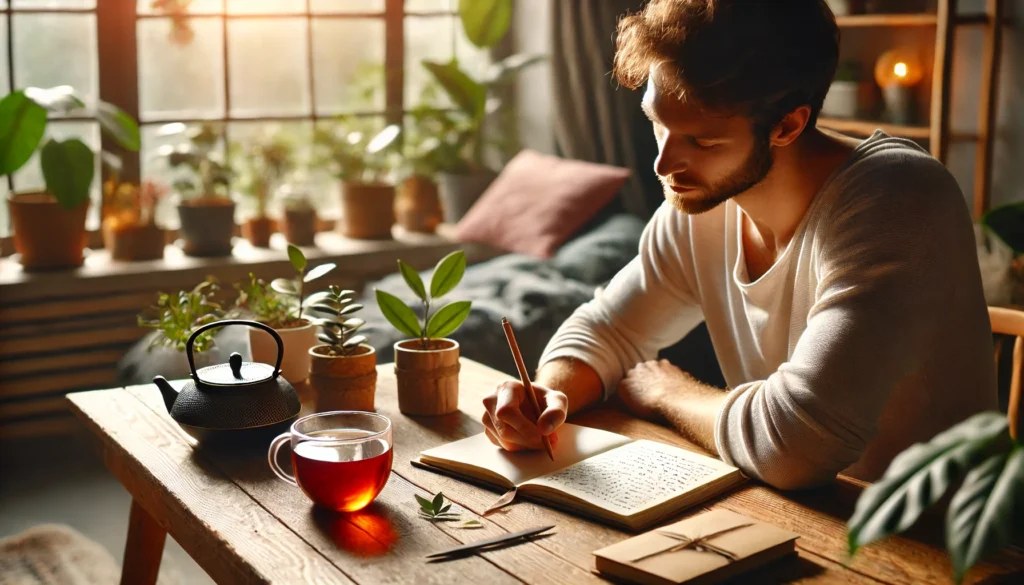In this article, we will explore various coping techniques to manage anxiety effectively, providing insights into both traditional and contemporary methods. By understanding and utilizing these techniques, individuals can better navigate the complexities of anxiety and lead more fulfilling lives.
You may also like: Effective Stress Management Techniques for Daily Life
Understanding Anxiety
Before delving into coping strategies, it’s crucial to understand what anxiety is and how it affects the body and mind. Anxiety is a natural response to stress, but when it becomes chronic, it can interfere with daily life and lead to other health issues.
The Biological Basis of Anxiety
Anxiety triggers the body’s fight-or-flight response, releasing hormones like adrenaline and cortisol. This response is beneficial in short bursts but can be detrimental if activated continuously. Understanding this biological mechanism can help individuals recognize the physical manifestations of anxiety and respond appropriately.
Physical Symptoms of Anxiety
Chronic anxiety can lead to physical symptoms such as headaches, muscle tension, and fatigue. These symptoms can be debilitating and may impact one’s ability to function effectively in daily life. Recognizing these signs early can aid in seeking timely intervention and adopting coping strategies to alleviate physical discomfort.
Psychological Impact of Anxiety
Apart from physical symptoms, anxiety can cause psychological symptoms like restlessness, irritability, and difficulty concentrating. These symptoms can strain personal and professional relationships and affect overall quality of life. Understanding the psychological impact of anxiety is crucial in developing a comprehensive management plan.
Traditional Coping Techniques
Traditional methods for managing anxiety have been practiced for centuries and are often rooted in holistic and natural approaches. These techniques focus on harnessing the body’s innate ability to achieve balance and calmness.
Deep Breathing and Meditation
Deep breathing and meditation are time-tested methods for managing anxiety. These techniques help calm the nervous system and reduce stress levels.
- Deep Breathing Practices: Focus on slow, deep breaths to reduce heart rate and promote relaxation. Techniques such as the 4-7-8 breathing method, where you inhale for 4 seconds, hold for 7, and exhale for 8, can be particularly effective in reducing anxiety symptoms.
- Mindfulness Meditation: Practice mindfulness meditation to clear the mind and focus on the present. This technique involves sitting quietly, focusing on your breathing, and observing thoughts without judgment. Regular practice can enhance emotional regulation and decrease reactivity to stressors.
- Guided Meditation Sessions: Engaging in guided meditation, available through apps or group sessions, can provide structured support for beginners, helping them ease into a regular meditation practice.
Physical Exercise
Exercise is a powerful stress reliever and can help reduce anxiety symptoms. Physical activity releases endorphins, the body’s natural mood elevators, and can improve sleep, which is often disrupted by anxiety.
- Aerobic Exercise Benefits: Activities like walking, running, and cycling can be particularly effective in reducing anxiety. The rhythmic nature of these exercises can have a meditative effect, further calming the mind.
- Yoga and Tai Chi Practices: These practices combine physical movement, meditation, and breathing exercises, providing a holistic approach to stress reduction. The emphasis on controlled breathing and slow movements helps lower stress levels and promote mental clarity.
- Strength Training: Engaging in strength training can also be beneficial. It not only improves physical fitness but also boosts self-esteem and body image, which can counteract anxiety.
Herbal and Natural Remedies
Many individuals turn to herbal and natural remedies as a complementary approach to managing anxiety. These remedies can offer relief without the side effects associated with some medications.
- Herbal Supplements: Supplements such as chamomile, valerian root, and passionflower are popular for their calming effects. They can be consumed as teas or capsules and may help in reducing anxiety symptoms naturally.
- Aromatherapy: Essential oils like lavender and bergamot can be used in aromatherapy to induce relaxation and reduce stress. Aromatherapy can be integrated into daily routines through diffusers or topical application.
- Nutritional Supplements: Omega-3 fatty acids and magnesium have been shown to support brain health and reduce anxiety. Incorporating these into your diet through supplements or food sources can contribute to overall mental well-being.

Modern Coping Strategies
Modern coping strategies leverage scientific advancements and psychological research to offer structured and evidence-based approaches to managing anxiety.
Cognitive Behavioral Therapy (CBT)
CBT is a well-researched psychological treatment that helps individuals understand and change negative thought patterns that contribute to anxiety. It involves working with a therapist to identify irrational beliefs and replace them with more realistic, positive ones.
- Structured Therapy Sessions: CBT typically involves structured sessions with a therapist, where individuals learn to identify and challenge distorted thoughts. This process helps in developing healthier thinking patterns and reducing anxiety.
- CBT Techniques at Home: Between sessions, individuals can practice CBT techniques such as journaling about negative thoughts and reframing them. This practice reinforces the skills learned in therapy and encourages self-reflection.
- Effectiveness of CBT: Research shows that CBT is effective for various types of anxiety disorders, including generalized anxiety disorder and social anxiety. Its structured approach makes it adaptable to individual needs and goals.
Mindfulness-Based Stress Reduction (MBSR)
MBSR is a structured program that combines mindfulness meditation and yoga. It teaches individuals to pay attention to the present moment and develop a non-judgmental awareness of their thoughts and feelings.
- Program Structure and Components: MBSR typically involves an 8-week program that includes weekly group sessions and daily home practices. Participants learn various mindfulness techniques, including body scans and mindful breathing.
- Impact on Brain Function: This practice can help reduce anxiety by altering the way the brain processes information and reacts to stress. Studies have shown changes in brain regions associated with attention and emotional regulation in those who practice MBSR regularly.
- Integrating MBSR into Daily Life: Participants are encouraged to integrate mindfulness into everyday activities, such as eating and walking, to cultivate a continuous state of awareness and reduce automatic reactions to stress.
Technology-Based Interventions
The digital age has ushered in various apps and online resources designed to help manage anxiety. These tools offer guided meditations, breathing exercises, and CBT-based activities that can be accessed anytime, anywhere.
- Mental Health Apps: Apps like Headspace and Calm provide guided meditation sessions and mindfulness exercises. They offer flexibility, allowing users to practice at their own pace and convenience.
- Virtual Therapy Sessions: Online therapy platforms offer access to licensed therapists without the need for in-person visits. This convenience can make therapy more accessible and less intimidating for some individuals.
- Interactive CBT Tools: Some apps incorporate interactive CBT exercises, providing users with practical tools to challenge negative thoughts and track their progress over time.
Coping Tools and Techniques
Having a toolkit of coping strategies can empower individuals to manage anxiety effectively. These tools can be personalized to fit individual preferences and lifestyles.
Journaling
Writing about your thoughts and feelings can be a therapeutic way to process emotions and reduce anxiety. Journaling helps clarify thoughts and provides a safe space to explore fears and concerns.
- Reflective Journaling: Reflective journaling involves writing about daily experiences and emotions. This practice encourages self-awareness and insight into anxiety triggers and patterns.
- Gratitude Journaling: Keeping a gratitude journal can shift focus from negative thoughts to positive aspects of life. Writing down things you’re grateful for can foster a more optimistic outlook and reduce anxiety.
- Creative Expression: Art journaling or using prompts can enhance the journaling experience. This creative outlet allows for self-expression and can be particularly beneficial for those who find traditional journaling challenging.
Social Support
Connecting with friends, family, or support groups can provide emotional support and reduce feelings of isolation. Sharing experiences with others who understand can be reassuring and provide new coping perspectives.
- Building a Support Network: Cultivating a network of supportive relationships can provide a buffer against anxiety. Regular communication with friends and family can offer emotional reassurance and practical advice.
- Peer Support Groups: Joining support groups, either in-person or online, can connect individuals with others facing similar challenges. Sharing experiences in a safe environment can validate feelings and foster a sense of community.
- Professional Support: Engaging with mental health professionals, such as therapists or counselors, can provide expert guidance and support. Professional interventions can complement personal and social coping strategies.
Technology-Based Interventions
The digital age has ushered in various apps and online resources designed to help manage anxiety. These tools offer guided meditations, breathing exercises, and CBT-based activities that can be accessed anytime, anywhere.
- Mental Health Apps: Apps like Headspace and Calm provide guided meditation sessions and mindfulness exercises. They offer flexibility, allowing users to practice at their own pace and convenience.
- Virtual Therapy Sessions: Online therapy platforms offer access to licensed therapists without the need for in-person visits. This convenience can make therapy more accessible and less intimidating for some individuals.
- Interactive CBT Tools: Some apps incorporate interactive CBT exercises, providing users with practical tools to challenge negative thoughts and track their progress over time.

Lifestyle Changes and Long-Term Strategies
Long-term management of anxiety involves making lifestyle changes that support mental well-being. These changes can have a profound impact on overall health and quality of life.
Nutrition and Hydration
A balanced diet and proper hydration can impact mental health significantly. Consuming foods rich in omega-3 fatty acids, magnesium, and vitamins B and D can support brain health and reduce anxiety symptoms.
- Nutrient-Rich Foods: Incorporating foods like fatty fish, nuts, and leafy greens into your diet can provide essential nutrients that support brain health. These foods can help reduce inflammation and promote cognitive function.
- Hydration and Mental Clarity: Staying hydrated is crucial for maintaining mental clarity and reducing fatigue. Dehydration can exacerbate anxiety symptoms, so it’s important to drink enough water throughout the day.
- Mindful Eating Practices: Practicing mindful eating can enhance the enjoyment of meals and reduce stress related to food choices. Paying attention to hunger cues and savoring each bite can promote a healthier relationship with food.
Sleep Hygiene
Establishing a regular sleep routine is crucial for managing anxiety. Aim for 7-9 hours of sleep per night and create a calming bedtime routine to improve sleep quality.
- Creating a Sleep-Conducive Environment: Ensure your bedroom is dark, quiet, and cool to promote restful sleep. Consider using blackout curtains, earplugs, or a white noise machine to create an optimal sleep environment.
- Consistent Sleep Schedule: Going to bed and waking up at the same time each day can regulate your body’s internal clock. Consistency helps improve the quality of sleep and reduces anxiety related to irregular sleep patterns.
- Relaxation Techniques Before Bed: Engage in calming activities like reading or taking a warm bath before bed. Avoid screens and stimulating activities in the hour leading up to bedtime to promote relaxation.
Limit Stimulants
Reducing caffeine and alcohol intake can help manage anxiety. Both substances can exacerbate anxiety symptoms and disrupt sleep patterns.
- Understanding Caffeine’s Impact: Caffeine is a stimulant that can increase heart rate and exacerbate anxiety. Limiting caffeine intake, especially in the afternoon and evening, can help reduce anxiety symptoms.
- Alcohol and Anxiety: Although alcohol may initially seem to reduce anxiety, it can disrupt sleep and worsen anxiety over time. Reducing alcohol consumption can lead to more stable mood regulation and better sleep quality.
- Substituting with Calming Beverages: Opt for herbal teas like chamomile or peppermint instead of caffeinated drinks. These alternatives can provide a soothing effect without the stimulating properties of caffeine.
Historical Context and Future Implications
Historically, anxiety has been understood in various ways, from ancient philosophical interpretations to modern psychological theories. Over time, our understanding of anxiety has evolved, leading to more effective treatment and management strategies.
Historical Perspectives on Anxiety
In ancient times, anxiety was often viewed through a spiritual or philosophical lens. Ancient philosophers and healers explored the nature of fear and worry, offering insights that continue to influence modern understanding.
- Ancient Philosophical Interpretations: Philosophers like Seneca and Epictetus discussed anxiety in the context of Stoicism, emphasizing the importance of rational thought and acceptance of the present moment.
- Traditional Healing Practices: Many cultures developed herbal remedies and rituals to address anxiety, reflecting a holistic approach to mental health. These practices laid the groundwork for contemporary natural remedies.
- Psychological Theories: As psychology emerged as a discipline, theories about anxiety evolved, leading to the development of modern therapeutic approaches like CBT.
Modern Scientific Advances
Advancements in neuroscience and psychology have provided deeper insights into the mechanisms of anxiety and its treatment.
- Neuroscientific Research: Studies have identified specific brain regions and neurotransmitters involved in anxiety, guiding the development of targeted interventions. Understanding these biological underpinnings has led to more effective treatments.
- Psychological Research: Research in psychology has identified cognitive and behavioral factors contributing to anxiety, informing therapeutic approaches. This body of knowledge continues to expand, offering new strategies for managing anxiety.
- Integration of Technology: Technology has revolutionized access to mental health resources, providing new tools for managing anxiety. From online therapy platforms to mental health apps, technology offers innovative solutions for individuals seeking support.
Future Directions in Anxiety Management
Looking ahead, advancements in neuroscience and technology promise to provide even more sophisticated tools for managing anxiety.
- Personalized Medicine: Research into genetic and biological markers of anxiety may lead to personalized treatment approaches. This could involve tailoring interventions based on individual genetic profiles and brain activity patterns.
- Virtual Reality Therapies: Virtual reality is being explored as a tool for exposure therapy and relaxation training. These immersive experiences offer new ways to address anxiety in a controlled and safe environment.
- Innovative Digital Interventions: Emerging technologies, such as artificial intelligence and machine learning, hold potential for developing personalized digital interventions. These tools could provide real-time support and feedback for individuals managing anxiety.

Conclusion
Anxiety is a complex condition, but with the right coping techniques, individuals can effectively manage their symptoms and improve their quality of life. By combining traditional methods with modern strategies, it’s possible to develop a comprehensive approach to anxiety management.
Remember, it’s essential to consult with healthcare professionals to tailor coping strategies to individual needs. With patience and persistence, managing anxiety is achievable, leading to a healthier, more balanced life.
By integrating these strategies into daily routines, individuals can build resilience and face life’s challenges with confidence and calmness.
Further Reading:
Depression and ways of coping with stress: A preliminary study
Stress Management Techniques and Strategies to Deal with Stress
Important Note: The information contained in this article is for general informational purposes only, and should not be construed as health or medical advice, nor is it intended to diagnose, prevent, treat, or cure any disease or health condition. Before embarking on any diet, fitness regimen, or program of nutritional supplementation, it is advisable to consult your healthcare professional in order to determine its safety and probable efficacy in terms of your individual state of health.
Regarding Nutritional Supplements Or Other Non-Prescription Health Products: If any nutritional supplements or other non-prescription health products are mentioned in the foregoing article, any claims or statements made about them have not been evaluated by the U.S. Food and Drug Administration, and such nutritional supplements or other health products are not intended to diagnose, treat, cure, or prevent any disease.


